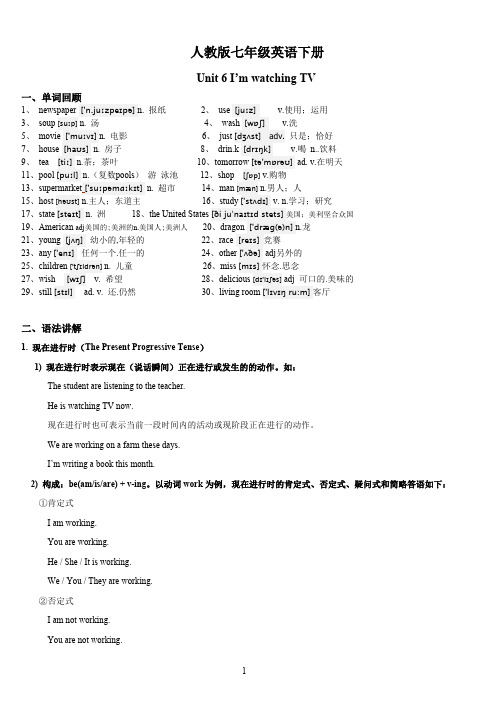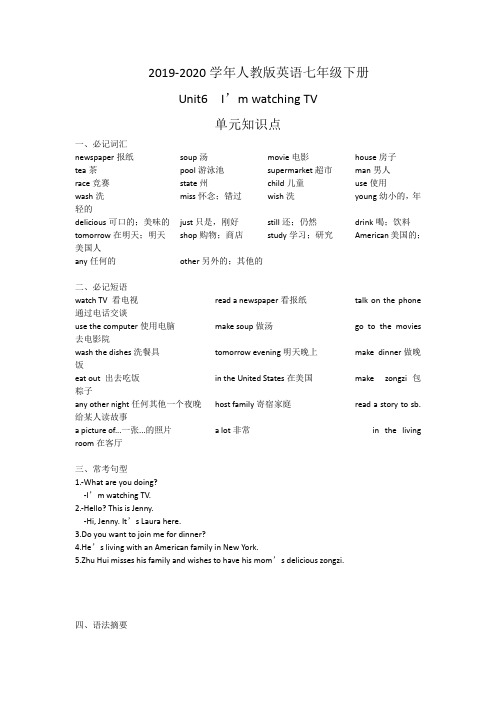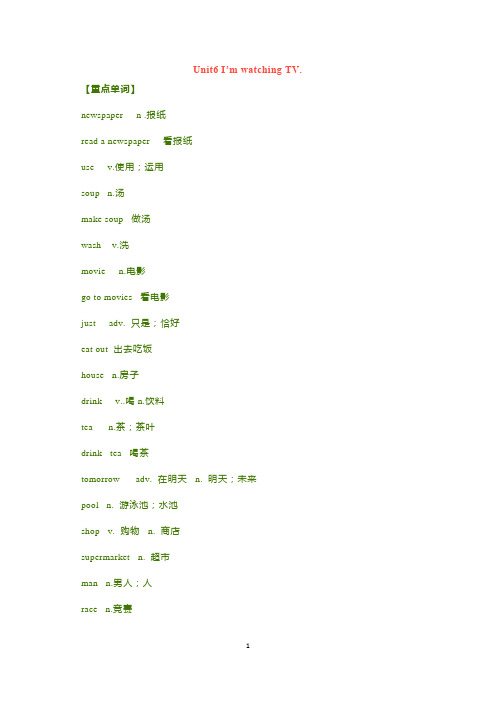人教版七年级下册Unit6I'm watching TV知识点
(完整版)人教版七年级英语下册unit6(详细内容)(最新整理)

人教版七年级英语下册Unit 6 I’m watching TV1、报纸2、use [juːz]v.使用;运用3、4、wash [wɒʃ]v.洗5、6、just [dʒʌst]adv.只是;恰好7、8、drin.k [drɪŋk]v.喝n..饮料9、tea 10、tomorrow [tə'mɒrəʊ] ad. v.在明天11、游泳池12、shop [ʃɒp] v.购物13、超市14、man [mæn] n.男人;人15、16、study ['stʌdɪ] v. n.学习;研究17、the United States [ði juˈnaɪtɪd stets]美国;美利坚合众国19、adj美国的;美洲的n.美国人;美洲人20、dragon ['dræg(ə)n]n.龙21、young [jʌŋ]幼小的,年轻的22、race [reɪs]竞赛23、any ['enɪ]任何一个.任一的24、other ['ʌðə] adj另外的25、children ['tʃɪldrən] n. 儿童26、miss [mɪs]怀念.思念27、wish [wɪʃ]v. 希望28、delicious [dɪ'lɪʃəs] adj 可口的.美味的29、still [stɪl]ad. v. 还.仍然30、living room ['lɪvɪŋ ru:m]客厅二、语法讲解1. 现在进行时(The Present Progressive Tense)1) 现在进行时表示现在(说话瞬间)正在进行或发生的的动作。
如:The student are listening to the teacher.He is watching TV now.现在进行时也可表示当前一段时间内的活动或现阶段正在进行的动作。
We are working on a farm these days.I’m writing a book this month.2) 构成:be(am/is/are) + v-ing。
2019-2020年人教版英语七年级下册Unit6 I'm watching TV单元知识点(含习题

2019-2020学年人教版英语七年级下册Unit6 I’m watching TV单元知识点一、必记词汇newspaper报纸soup汤movie电影house房子tea茶pool游泳池supermarket超市man男人race竞赛state州child儿童use使用wash洗miss怀念;错过wish洗young幼小的,年轻的delicious可口的;美味的just只是,刚好still还;仍然drink喝;饮料tomorrow在明天;明天shop购物;商店study学习;研究American美国的;美国人any任何的other另外的;其他的二、必记短语watch TV 看电视read a newspaper看报纸talk on the phone 通过电话交谈use the computer使用电脑make soup做汤go to the movies 去电影院wash the dishes洗餐具tomorrow evening明天晚上make dinner做晚饭eat out 出去吃饭in the United States在美国make zongzi包粽子any other night任何其他一个夜晚host family寄宿家庭read a story to sb.给某人读故事a picture of...一张...的照片 a lot非常in the living room在客厅三、常考句型1.-What are you doing?-I’m watching TV.2.-Hello? This is Jenny.-Hi, Jenny. It’s Laura here.3.Do you want to join me for dinner?4.He’s living with an American family in New York.5.Zhu Hui misses his family and wishes to have his mom’s delicious zongzi.四、语法摘要重点:现在进行时的定义、结构、标志词及动词ing形式的变化规则。
初中英语人教新目标七年级下册Unit 6 I’m watching TV单元知识点整理

七年级英语下册Unit6知识点【Useful expressions】1.read a newspaper/book 看报/读书2.talk on the phone 通过电话交谈3.make soup 煲汤4.wash/do/ the dishes 洗碗5.at home 在家6.eat out 外出就餐7.I'd love to=I would love /like to 我愿意/我想8.see you then. 再见9.wash the clothes 洗衣服10.make dinner 做饭11.drink tea 喝茶12.go to the movies 看电影13.think about/think of ...认为、考虑......14.live with... 和......居住在一起15.in the United States 在美国16.Dragon Boat Festival 端午节17.on TV 在电视里18.any other+可数名词单数其他任何一个19.read sth.to sb. 读......给......听20.wish to do sth 希望做......21.a lot=very much 非常22.talk show 脱口秀23.write about... 写关于......24.study for a test 复习迎考25.host family 寄宿家庭26.on the Internet 通过互联网e the computer用电脑28.Not much 没什么29.miss one’s family 想家30.at school 在学校【Target sentences】1.—What are you doing?—I’m watching TV.2.—What’s John doing?—He’s washing the dishes.3.— What are Dave and Mary doing?—They’re listening to a CD.4.— Where is he swimming?— At/In the pool.5.— Is she shopping?— Yes, she is.6.— Is he doing his homework?—No, he isn’t.7.—Are you doing your homework?—No,I'm not.I'm cleaning my room.8.Do you want to join me for dinner?9.What do you think of his home in China?10.His dad and uncle are watching the boat races on TV.11.The mother is reading a story to her young children.12.He's talking on the phone to/with his cousin in Shenzhen.13.Zhu Hui misses his family and hopes to have his mom's delicious zongzi.14.But there's still no place like homehome.15.Zhu Hui loves New York and his host family a lot.【Language points】1.He is reading a newspaper.newspaper n.报纸为可数名词,“看报纸”要用read a newspaper.【易混辨析】in the newspaper与on the newspaperLook! Your photo is in the newspaper.看!你的照片上报纸了。
人教版英语七年级下册Unit6I’mWatchingTV单元知识点总结

人教版英语七年级下册Unit6I’mWatchingTV单元知识点总结2019-2020学年人教版英语七年级下册Unit 6 I’m Watching TV单元知识点◆重点短语1. Read a newspaper 阅读一份报纸2. Go to the movies = go to the cinema = go to see a film 去看电影3. Talk on the phone 通过电话交谈4. Be used to do sth = be used for doing sth 用来做......5. Using the computer 使用电脑6. Make soup 煮汤7. Washing the dishes 洗盘子8. Eat out = go out to dinner = dine out 出去吃饭9. Drink tea = have tea 喝茶10. The day after tomorrow 后天11. The day before yesterday 前天12. Go shopping 去购物13. Dragon Boat Festival 端午节14. Washing my clothes = do some washing / do the washing 洗衣服15. Join me for dinner = have dinner with me 和我一起吃晚餐16. Show sb sth = show sth to sb 向某人展示某物17. Be on show 展出、展览18. Show sb around 带领某人参观19. Wish sb to do sth 希望某人去做某事20. Wish sb sth 祝愿某人某事21. Best wishes to you 给你最美好的祝愿22. Listen to music 听音乐23. Host family 寄宿家庭24. Boat race 龙舟比赛用法集萃1.What + be + 主语+ doing? ......正在做某事主语+ be + doing sth ......正在做某事2.I’d love/ like to do sth 我愿意做某事3.Any other + 可数名词单数其他任何一个......4.Wish to do sth 希望做某事◆典句必背1.What are you doing? 你在做什么?I’m watching TV. 我在看电视。
人教版新目标Unit6-I'm-watching-TV知识点

Unit6 I’m watching TV一、词组、短语及用法1.do one’s homework (此处的do是“做”的意思)2.talk on the phone 打电话交谈3.watch look see read 的大致区别:watch 观看,看watch TV 看电视watch a football game 看一场足球比赛see 看见(看的结果)I can see the bird in the tree.look 看(看的动作)Please look at the blackboard.read 阅读,读书,读报She is reading a story.4.go to the movies 去看电影5.That sounds good. 那听起来不错 show 电视节目7.at six o’clock 在六点钟8. wait for sb /sth 等侯某人/某物9. all 、also 、often 、never 等副词应该放在be动词,情态动词及助动词之后,行为动词之前。
He never stop talking. I often get up at six.We are all students.The boys can also swim.They all like English. Lions also come from South Africa.10. thanks for sth 谢谢某物Thanks for your letter.thanks for doing sth 谢谢做了某事Thanks for joining us.11. some of + 宾格代词(us / you /them )some of us 我门当中的一些人Some of +名词复数some of the students 一些学生12. in the first /second /next / last photo 在第一/第二/下一个/最后一张照片里13. at school 在学校at home 在家at the pool 在游泳池at the mall在商店14. be with sb 与某人一起He is with his parents. 他和他的父母在一起。
人教版七年级英语下册Unit6 I’m watching TV要点详解

I’m watching TV.要点详解1.(1) What are you doing? 你在干什么?表示询问“某人正在干什么?”可用上述句型,即:What + be +主语+ doing 句型中be动词应根据主语的人称、数的变化来选择。
主语为第一人称单数用am,为第三人称单数用is,其余一律用are。
例:What is he doing? 他在于什么?What are the students doing? 学生们在于什么?(2) “be(am、is are)+doing”构成现在进行时,常用于以下几种情况:①表示现在(说话瞬间)正在进行或发生的动作。
It is raining now. 现在正在下雨.Look! He is working in the office. 看!他正在办公室工作。
②现在进行时也可表示前一段时间内的活动或现阶段正在进行的动作。
My brother is reading a story book this week.我弟弟这周正在看一本故事书。
They are working in a hospital these days. 这些天他们在医院里工作。
③也用来表示一个在最近按计划或安排要进行的动作。
(这时多用一个表示将来时间的状语)We are leaving on Friday. 我们将于星期五动身。
(3) v. +ing形式在语法上有时也称为现在分词或动名词,其构成如下:①一般情况在动词原形之后直接加-ing。
work- working go- going②以不发音的e结尾的词,去e再加-ing。
come--coming ride--riding2. Do you want to go to the movies? 你想去看电影吗?表示“电影”美国英语为movie,而英国英语中常用film。
“看电影”美国人常说go to the movies, 而英国人常说see a film或go to the cinema。
人教版七年级英语下册-Unit 6:知识点总结+单元测试(word版,含答案)

Unit6 I’m watching TV.【重点单词】newspaper n .报纸read a newspaper 看报纸use v.使用;运用soup n.汤make soup 做汤wash v.洗movie n.电影go to movies 看电影just adv. 只是;恰好eat out 出去吃饭house n.房子drink v..喝n.饮料tea n.茶;茶叶drink tea 喝茶tomorrow adv. 在明天 n. 明天;未来pool n. 游泳池;水池shop v. 购物 n. 商店supermarket n. 超市man n.男人;人race n.竞赛host n.主人;东道主study v./n. 学习;研究state n. 洲the United States 美国;美利坚合众国American adj. 美国的;美洲的n. 美国人;美洲人dragon n.龙Dragon Boat Festival 端午节any adj. 任何的,任一的 pron. 任何;任一other adj. 另外的;其他的 pron. 另外的人(或物)young adj. 幼小的,年轻的children n. 儿童miss v.怀念. 思念wish v. 希望delicious adj. 可口的,美味的still adv. 还.仍然living room 客厅【重点短语】1.watch TV看电视2. read a newspaper 看报纸3. talk on the phone 通过电话交谈4. listen to a CD 听CD5. a useful book 一本有用的书6. make soup 做汤7. wash the dishes 洗碟子8. go to the movies 去看电影9. at home 在家10. eat out 在外面吃11. drink tea 喝茶12.Dragon Boat Festival 端午节13. make zongzi 包粽子14. watch the boat races 看龙舟比赛15. the night before the festival 节日前的晚上16. any other night 任何其他的晚上17. his host family 他的寄宿家庭18. read a story to sb 读故事给某人19. miss sb. 思念某人miss doing sth 错过做某事20. wish to do sth希望做某事wish sb to do sth希望某人做某事hope to do sth希望做某事21. no place like home 没有地方像家一样22. in the United States 在美国23. study for a test 为一个考试而学习【重点句型】1.一What are they doing?他们在干什么?—They’re listening to a CD.他们在听光碟。
Unit6I’mwatchingTV知识点人教版七年级英语下册

Unit 6 I’m watching TV 词汇精讲一、词组、短语及用法【重点短语】1.watch TV看电视2. read a newspaper 看报纸3. talk on the phone 通过交谈4. listen to a CD 听CD5. a useful book 一本有用的书6. make soup 做汤7. wash the dishes 洗碟子8. go to the movies 去看电影9. at home 在家10. eat out 在外面吃11. drink tea 喝茶12.Dragon Boat Festival 端午节13. make zongzi 包粽子14. watch the boat races 看龙舟比赛15. the night before the festival 节日前的晚上16. any other night 任何其他的晚上17. his host family 他的寄宿家庭18. read a story to sb 读故事给某人19. miss sb. 思念某人miss doing sth 错过做某事20. wish to do sth希望做某事wish sb to do sth希望某人做某事hope to do sth希望做某事21. no place like home 没有地方像家一样22. in the United States 在美国23. study for a test 为一个考试而学习1.newspaper(1)newspaper意为“报纸”,是可数名词。
“在报纸上”用英语表示为“in the/a newspaper”,不能用介词on。
我们日常所说的晨报/晚报是morning / evening newspapers。
例如:She likes reading newspapers. 她喜欢看报纸。
(2)newspaper是由news和paper构成的合成词,合成词是一种重要的构词法,对我们记忆单词很有帮助。
- 1、下载文档前请自行甄别文档内容的完整性,平台不提供额外的编辑、内容补充、找答案等附加服务。
- 2、"仅部分预览"的文档,不可在线预览部分如存在完整性等问题,可反馈申请退款(可完整预览的文档不适用该条件!)。
- 3、如文档侵犯您的权益,请联系客服反馈,我们会尽快为您处理(人工客服工作时间:9:00-18:30)。
Unit6 I’m watching TV语法知识点一、词组、短语及用法1. 现在进行时态的构成:主语+ be+ v-ing表示此时此刻正在发生或正在进行的动作2. do one’s homework (此处的do是“做”的意思)3. talk on the phone4. watch look see read 的大致区别:watch 观看,看watch TV 看电视watch a football game 看一场足球比赛see 看见(看的结果)I can see the bird in the tree.look 看(看的动Please look at the blackboard. read 阅读,读书,读报She is reading a story.5. go to the movies 去看电影6. That sounds good. 那听起来不错7. TV show 电视节目8. at six o’clock 在六点钟9. wait for sb /sth 等侯某人/某物10. all 、also 、often 、never 等副词应该放在be动词,情态动词及助动词之后,行为动词之前。
He never stop talking. I often get up at six. 例如:We are all students. The boys can also swim.They all like English. Lions also come from South Africa.12. thanks for sth 谢谢某物Thanks for your letter. thanks for doing sth 谢谢做了某事Thanks for joining us.13. some of + 宾格代词(us / you /them )some of us 我门当中的一些人Some of +名词复数some of the students 一些学生14. in the first /second /next / last photo 在第一/第二/下一个/最后一张照片里15. at school 在学校at home 在家at the pool 在游泳池at the mall在商店16. be with sb 与某人一起He is with his parents. 他和他的父母在一起。
17. with 是一个介词,with短语不能做主语:请区别以下两个句子:Tom with his friends is playing soccer. Tom and his friends are playing soccer.18. a photo of my family 一张我家的照片二、句型(1)-What+be+主语+doing? 正在做什么?-主语+be+doing…正在做某事。
例:-what are you doing? -I’m doing my homework.(2)-Thanks for …为。
而感谢例:Thanks for your letter. (3)-Here are/is…例:Here are some of my photos. Here is a photo of my family. (4)-That sounds good. (5)-This TV show is boring.三、重点句式及注意事项1.他正在干什么?What is he doing? 他正在吃饭He is eating dinner.他正在哪里吃饭?Where is he eating dinner? 他正在家里吃饭He is eating dinner at home.2.你想什么时候去?When do you want to go? 让我们六点钟去吧。
Let’s go at six o’clock.3.他正在等什么?What is he waiting for? 他正在等公交车。
He is waiting for a bus.4.他们正在和谁说话?Who are they talking with? 他们正在和Miss Wu说话。
They are talking with Miss Wu.5.你们正在谈论什么?What are you talking about 我们正在谈论天气We are talking about the weather.6.他们都正在去上学。
They are all going to school.7.这儿是一些我的照片。
Here are some of my photos.这儿是一些肉Here is some of meat.(some of meat不可数,故用is)8.谢谢你帮我买这本书。
Thank you for helping me buy this book.9.family 家;家庭。
强调“整体”,是单数;强调“成员”时,是复数。
His family has a shower. 他们家有一个淋浴。
His family are watching TV. 他全家在看电视。
四、重点句子1. What are you doing? I’m watching TV.2. What’s he doing? He’s reading.3. This TV show is boring.4. Is Nancy doing homework? No, she isn’t.5. When do you want to go? Let’s go at six o’ clock.6. What’s he taking?7. What’s he waiting for?8. What are they talking about? 9. Where are the all doing?10. Where do people play basketball? At school 11. Is Tina there? No, she isn’t.12. Thanks for your letter and the photos. 13. Here are some of my photos.14. I’m with my sister Gina.15. Here is a photo of my family.五、语法现在进行时Ⅰ现在进行时的用法表示现在(说话瞬间)正在进行或发生的动作Ⅱ现在进行时时间状语及标志性词①now 现在②at this time 在这时③at the moment 现在④look 看(后面有“!”)⑤listen 听(后面有“!”)Ⅲ现在分词的构成①一般在动词结尾处加ing Eg: go—going look--looking②以不发音字母e结尾的动词,去e加ing。
Eg: write—writing close--closing③以重读闭音节结尾的动词,如果末尾只有一个辅音字母,应先双写这个字母,再加ing.Eg: get—getting run—running (swim, run, put,get,sit,begin)Ⅳ现在进行时的构成肯定句: 主语+ am/is/are+ doing +其他+时状. Eg: He is doing his homework now.否定句:主语+am/is/are +not+ doing+其他+时状. Eg: He is not doing his homework now.一般疑问句:Am/Is/Are +主语+ doing+其他+时状?Eg: Is he doing his homework now?肯定回答:Yes,主语+am/is/are Eg:Yes, he is.否定回答:No, 主语+am not/isn’t/aren’t Eg: No, he isn’t.六、日常交际用语(1)-Do you want to go to the movices? –Sure.(2)-When do you want to go? –Let’s go at seven.(3)-Where do people play basketball? –At school.(4)-What’s he waiting for?-He’s waiting for a bus.(5)-What’s he reading? He’s reading a newspaper.1)现在在进行时的形式是:助动词be(am,is,are)+动词-ing形式(也叫现在分词),表示现在(说话的瞬间)正在进行或发生的动作。
2)现在进行时的肯定句形式主语+be(am,is,are)+动词现在分词+其他I’m watching TV.3)现在进行时的否定句形式主语+be(am,is,are)+not+动词现在分词+其他They are not playing soccer.4)现在进行时的一般疑问句形式及回答:Is(am,are)+主语+动词现在分词+其他?Yes,主语+is/am/are. No,主语+isn’t/aren’t/am not.Are you reading? Yes,I am. No,I am not.5)现在进行时的特殊疑问句形式:特殊疑问词+is/am/are+主语+现在分词+其他?例:What is your brother doing?6)动词+ing形式(现在分词)的构成.1.一般情况下在动词词结尾加-ing.如: eat--eating, do—doing,clean—cleaning,play—playing,2.以不发音的元音字母e结尾的动词,先去掉e再加-ing.如:take--taking,write—writing,have-havingcome—coming.dance--dancing3.词尾如果是以一个辅音字母结尾的重读闭音节词.应该先双写这个辅音字母,再加-ing.如:run—runing,sit—sitting ,swim—swimming. Shop—shopping.put—putting,sit—sitting。
